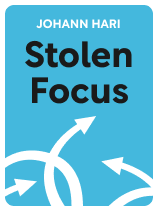

This article is an excerpt from the Shortform book guide to "Stolen Focus" by Johann Hari. Shortform has the world's best summaries and analyses of books you should be reading.
Like this article? Sign up for a free trial here .
Is technology distracting? Is technology a personal or a societal issue?
The book Stolen Focus by Johann Hari claims that technology contributes to society’s attention crisis. Hari argues that the technology we rely on tracks our every move and tailors the content we see to keep us hooked.
Here’s how technology intentionally distracts you from things you need to focus on.
Technology Hurts Our Focus as Individuals
Why is technology distracting? Hari contends most technology is intentionally designed to distract us—for profit. The business model of most screen-based technology relies on engagement. Every second you’re watching your screen is an advertising second tech companies can sell.
The more engaged you are with technology, the more distracted you are from whatever you’re supposed to be doing. Hari identifies three ways tech disrupts your attention:
1) Designing for interruptions. Technology operates on the insights of behavioral psychology: People crave rewards and they will adjust their behavior to get them. Technology can train you to need whatever reward it can offer so that you stay engaged for as long as possible, or return to it as quickly as possible.
2) Accumulating your metadata. Every time you click on something, you feed information to the website or application you’re using. That information helps the business behind it build an accurate file on who you are and what you’re into. That information tells it what kind of content to show you to keep you glued to your screen. Companies use your data to persuade advertisers to spend money on their site or app because they know who to show ads to. This is known as surveillance capitalism.
3) Making you angry. To keep your eyes on them for as long as possible, apps developed sophisticated algorithms that show you the content they know you’ll respond to. But the negativity bias we all have makes you pay special attention to information that makes you upset or angry. Anger diminishes your ability to pay attention to the quality of ideas you encounter. You default to deciding how the idea makes you feel, rather than critically analyzing its value.
Technology Hurts Our Focus as a Society
Hari argues that anger also disrupts our ability to see larger commonalities and solve problems collectively as a society. This happens in two ways:
1) Since each individual is receiving input that’s making them angry and is sharing that anger online, you come to believe that everyone is enraged. (Shortform note: Research shows that we also spread anger by mirroring others’ anger or nastiness in texts and social media exchanges; however, we can also stop the spread with positivity and kindness.)
2) At the same time, social media makes it easier for misinformation to spread. That means people are often incensed about incorrect information. The feeling of collective anger and the difficulty in finding the right information makes you vigilant and defensive and makes it harder to have constructive conversations.
(Shortform note: Compounding the difficulty of sorting true from false information, MIT research shows that false information spreads much more quickly and widely—for instance, falsehoods on Twitter are 70% more likely to be retweeted than the truth, and they reach the first 1,500 people six times faster.)
Protect Your Focus From Technology
There are strategies to avoid the dangers of technology that Hari lays out above:
1) Anticipate distractions. In Digital Minimalism, Cal Newport argues that if you understand how technology works, you can be strategic in how you use it. For example, social media apps are designed to be more addictive than their web versions, so you can delete the apps from your phone and access your accounts from the web browser.
2) Make yourself harder to surveil. Tech’s surveillance capitalism techniques will always be one step ahead, but you can still make their job a little harder. For example, you can use a virtual private network (VPN) to keep your browsing information encrypted, block cookies, and create an alternative email address for websites that require you to give information.
3) Be aware. Next time you find yourself getting angry over something you see online, remember that tech companies know exactly what effect the algorithm is having on you, and they keep it going because they can profit from it. Also, keep in mind that the information that exists online is not required to be truthful, so before you get upset at something you read, do your homework to find out if it’s true.

———End of Preview———
Like what you just read? Read the rest of the world's best book summary and analysis of Johann Hari's "Stolen Focus" at Shortform .
Here's what you'll find in our full Stolen Focus summary :
- The seven factors causing the current attention crisis
- Johann Hari's three-part solution to gaining your attention back
- Why society needs to change, not just individuals






